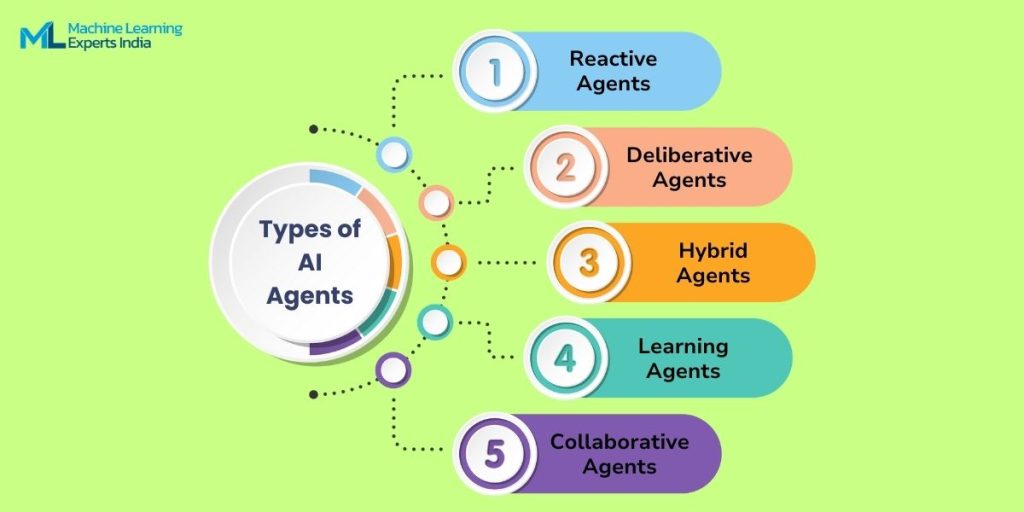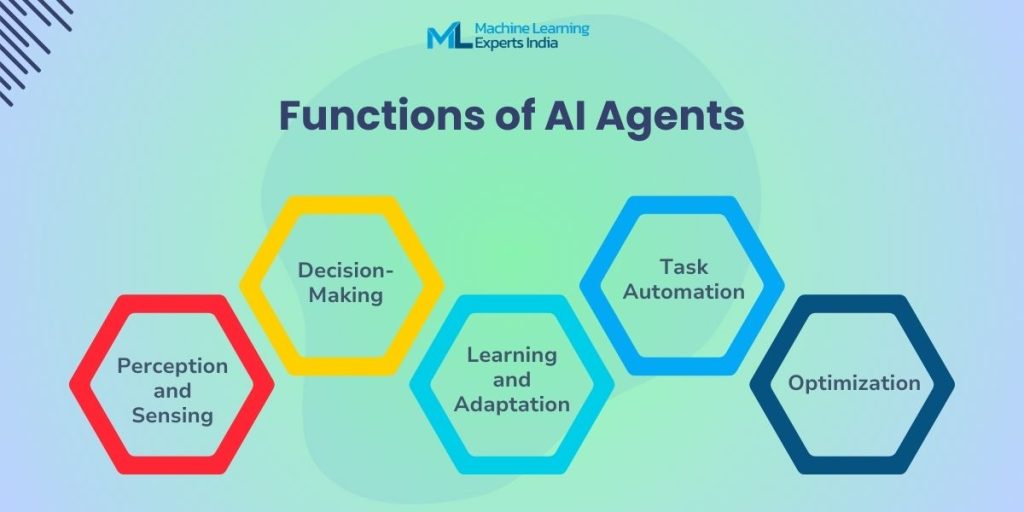What Are AI Agents: Explore Types, Functions, and Industry Use Cases
Artificial intelligence, or AI, is not a concept that exists in the future but has become a part of technology at present. In recent years, compared to simple machine learning and algorithms, the field of artificial intelligence has advanced to an extent where these systems are eligible for decision-making, problem-solving, and interaction with the human world.
So faced with the given notions, one of the critical elements in the sphere of AI is the so-called AI agent.
But what exactly is meant by the term AI agents?
AI Agents: The definition and its working model will help enhance the understanding of what the concept is, the different types of those agents, and how it has been implemented in various companies.
Basic Understanding of an AI Agent
An AI agent is any designed and intelligent entity able to receive information from its surrounding environment, process it to decide upon the most suitable action, and continue acting in the defined goal. An AI agent can be compared to an assistant or a system that can perform activities on its own without being supervised all the time.
This happens due to the characteristics of AI agents that can work in interacting environments and learn from them, as well as recognize and change with time to maximize their performance.
These agents can also work at various levels, ranging from simple automated processes to ones that involve decisions.
Key Characteristics of AI Agents
It then means that AI agents have some relative qualities that distinguish them from regular programs:
Control: direction because of possessing adequate amounts of data as well as freedom from direct guidance.
Perception: A feature that enables the organism to receive information from the environment or within itself from the use of sensors or input instruments.
Extent: Every AI agent can act for itself and take action to fulfill its objectives.
Intelligence: They can understand and change accordingly, in light of any comments made by other parties or any changes that may suit their existence.
Thus, let’s attempt to clarify the peculiarities of such types of AI agents, their functions, and the spheres where those magnificent creatures are already working.
Related Blog: How AI and ML Development Services Can Enhance Your Business?
Types of AI Agents
AI agents can therefore be categorized in numerous ways depending on their capabilities, sophistication, and operating context.

Here are the detailed categories of AI agents.
1. Reactive Agents
Agent types can be divided into several categories, though some of them are as follows: Reactive agents are the most basic type of AI agents. They have no dependence on internal models and deep learning facilities.
They act according to this plan based on certain programs that are installed in them and from the interaction with the environment after program execution. These agents do not remember what has happened in the past; they do not even identify patterns; they just do what they are programmed to do at the present, given inputs.
Example: A thermostat is a part of an environment or a context and interacts with an environment. Extent: It is even capable of changing temperatures that are read from the environment.
2. Deliberative Agents
Deliberative agents are more advanced. These types of agents can reason, conclude, and then plan what they are going to do next. They consider the environment, goals, and previous experiences and come up with some plan or strategy to accomplish objectives.
Example: An autonomous vacuum cleaner that navigates around the area moves around the room and plans on how to clean the place systematically.
3. Hybrid Agents
Unlike the two other types of agents, which are entirely passive-reactive agents and active-deliberative agents, hybrid agents contain both characteristics of both types. They consist of two tiers of decision-making: one is the instant reactive reaction, and the other is more strategic and rational. These agents are thus efficient, adaptive, and versatile.
Example: Self-driven cars employ hybrid AI agents. They respond to driveways’ turns immediately but can also calculate a route based on numerous factors of the surroundings.
4. Learning Agents
Learning agents are of a higher A level and have the feature of learning from the environment in which they are located. It even has what is called reactive and adaptable behavior to some extent to moments of stimuli and previous experiences. The use of corresponding types of machine learning, including reinforcement learning and deep learning, makes these agents learn more intricate procedures and become more efficient as time progresses.
Example: Personal assistants like Siri, Alexa, or Google Assistant. They adapt to your usage and can offer even better recommendations as well as replies.
5. Collaborative Agents
Collaborative agents act on behalf of the other agents or interact sometimes with humans to achieve the major objectives that they have set for common ends. In this capacity, they synchronize work, share information, and work together in flow in complex environments.
Related Blog: Machine Learning vs Deep Learning vs Generative AI: Unravel The Future of AI
Functions of AI Agents
AI agents can perform so many roles based on the needs of an industry or an application that they are being implemented on. Here are some of the functions that are generally carried out by such offices.

1. Perception and Sensing
First, AI agents operate in an environment that is characterized by input modalities, for instance, cameras, microphones, or any other input interface. Collect, analyze, and understand the objective reality of a given environment. For instance, AI agents such as robots called full-fledged or plugged-in agents depend on sensory information of the surroundings.
2. Decision-Making
AI agents excel in decision-making. Through reasoning on the data, they arrive at decisions, and on some occasions, they make use of probabilities in making the right decisions. It is also valuable when it is necessary to detect fraud or to choose the best way in a network.
3. Learning and Adaptation
As stated earlier, learning is one of the essential aspects of an AI agent, and it adapts to the conditions in its environment. It learns new knowledge through time and employs an elaborate process to enhance the knowledge used to formulate its decision-making process. This flexibility is highly important in many scenarios, such as both customer service chatbots as well as trading bots for the financial markets.
4. Task Automation
AI agents can replace mankind in performing many detailed, repetitive processes and save time. They are also capable of managing meetings as well as handling customer inquiries. For instance, automated chatbots are used to address various customer support issues, meaning that organizations get quick services at cut-down expenses.
5. Optimization
AI agents are capable of making processes and systems as efficient as possible. For example, in logistics, an AI agent may establish supply chain routes because it will be efficient and cost-effective as well as fast. Likewise, in the digital marketing environment, AI agents are in a position to manage advertising campaigns on a real-time basis.
AI Agents in Industry: Use Cases
AI agents have moved past their boundaries at research labs and theoretical applications to actively transform existing industries.
The significance of AI agents emerges through various key areas, which include:
Healthcare
AI agents transform healthcare operations through their medical capabilities for patient diagnosis and treatment planning as well as health monitoring services. The AI system enables medical image analysis, which detects medical problems that radiologists may not observe.
IBM Watson Health deploys AI agents that scan patient information to help medical practitioners diagnose cancer alongside treatment efficacy prediction.
Finance and Banking
The finance industry implements AI agents for fraud prevention together with risk calculation work and service engagement support. Financial agents process large amounts of financial data through analysis to detect fraudulent activities and maximize investment portfolio potential.
The banking industry uses virtual assistants and chatbots to give round-the-clock assistance for customer operations and transactions and loan administration services.
Retail and eCommerce
Retail as well as e-commerce benefit from AI agents, which optimize the customer experience through intensive improvement. Artificial intelligence-based personalization engines utilize customer data to generate product recommendations concerning past activities and purchasing patterns. Customer support queries handled by AI agents result in human agents being free to support customers with complex matters.
Through AI systems, Amazon activates recommendation functionalities that generate product suggestions for customers according to their search activities and purchase records.
Transportation and Autonomous Vehicles
The purpose of autonomous vehicles lies in their capacity to eliminate human mistakes while simultaneously enhancing road security conditions as well as streamlining traffic flow.
The autonomous driving technology of Tesla operates with AI agents that examine road situations combined with traffic lights and nearby vehicles to produce real-time decisions that ensure safety.
Manufacturing and Supply Chain
In manufacturing, supply chain, and logistics, AI agents improve production lines, minimize costs, and forecast the equipment’s mechanical issues. AI agents monitor the products and help in the demand forecasting process and delivery routes to minimize costs and maximize benefits for a firm.
Example: Siemens and other companies use AI marketing agents in smart industries like manufacturing, maintenance, and logistics to ensure production machinery runs smoothly.
Customer Service
Businesses use chatbots and virtual assistants for 24/7 customer service. Some handle FAQs, others manage transactions, and some resolve queries.
Concluding Thoughts
AI agents are application-focused technologies that are reshaping industries in the manner in which they streamline work. No matter if it is about improving relations with customers, supply chain management, or making sophisticated decisions, an AI agent is critical in times of automation.
Hence, their capacity to reason, learn, decide, and assimilate information makes them useful in almost all fields, inclusive of the health, retail, and transport industries.
Thus, AI agents promise to shape the near future, and AI technology plays a key role in driving further digitalization.
FAQs
What is the difference between AI agents and traditional software programs?
AI agents differ from traditional software by perceiving, deciding, and learning. While regular software follows fixed instructions, AI adapts and learns from past results.
How do AI agents learn and improve their decision-making over time?
Supervised learning helps AI agents process data and recognize patterns. These agents learn from past actions, refine responses, and improve decision-making.
What are the real-world benefits of using AI agents in businesses?
AI agents make man’s work easier, reduce the chances of human error, and help in decision-making processes worldwide. Customer support uses AI chatbots, diagnostics rely on AI for accuracy, and anti-fraud systems detect fraud. AI also enhances production lines. With less human intervention and greater accuracy, AI agents save time, cut costs, and boost productivity.


